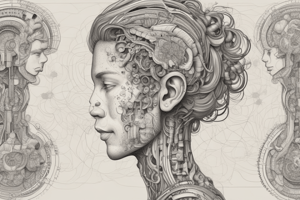Podcast
Questions and Answers
True or False: Comparative cognition is the study of information processing across different species, including humans.
True or False: Comparative cognition is the study of information processing across different species, including humans.
True (A)
Which of the following is a research topic in the study of information processing across species, including humans?
Which of the following is a research topic in the study of information processing across species, including humans?
- memory, decision making, categorisation. (correct)
- physical adaptations
- animal behaviour
- social interactions
createa fill in the blanks question form this: COMPARATIVE COGNITION
The study of information
processing across species,
including humans.
Some research topics include: ____, ____, ____, ____, ____, ____.
createa fill in the blanks question form this: COMPARATIVE COGNITION The study of information processing across species, including humans. Some research topics include: ____, ____, ____, ____, ____, ____.
Memory, Categorisation, Decision making, Problem solving, Language use, Deception
True or False: According to de Waal (2016), the Theory of Mind refers to the ability to attribute mental states to others, such as knowledge, intentions, and beliefs.
True or False: According to de Waal (2016), the Theory of Mind refers to the ability to attribute mental states to others, such as knowledge, intentions, and beliefs.
Which of the following is required for an animal to share or conceal information from others, according to the Theory of Mind?
Which of the following is required for an animal to share or conceal information from others, according to the Theory of Mind?
True or False: According to Professor Frans de Waal, animals can use tools to fix something for the future, indicating that they do have a sense of the future and the ability to plan ahead.
True or False: According to Professor Frans de Waal, animals can use tools to fix something for the future, indicating that they do have a sense of the future and the ability to plan ahead.
Which of the following examples demonstrates that animals have the ability to plan for the future?
Which of the following examples demonstrates that animals have the ability to plan for the future?
True or False: The mark and mirror test is a classic test of self-awareness where a mark is placed on an animal's face or body, and their behavior in response to the image in the mirror is observed.
True or False: The mark and mirror test is a classic test of self-awareness where a mark is placed on an animal's face or body, and their behavior in response to the image in the mirror is observed.
Multiple Choice: Who developed the mark and mirror test?
Multiple Choice: Who developed the mark and mirror test?
Fill in the blanks: The mark and mirror test was developed by ________, an animal behaviorist, and ________, a clinical child psychologist.
Fill in the blanks: The mark and mirror test was developed by ________, an animal behaviorist, and ________, a clinical child psychologist.
True or False: Dolphins and whales have hands, making it easy to design cognitive tests for them.
True or False: Dolphins and whales have hands, making it easy to design cognitive tests for them.
Multiple Choice: Which of the following are cognitive tests for dolphins?
Multiple Choice: Which of the following are cognitive tests for dolphins?
Fill in the blanks: Cognitive tests for dolphins include ________ tasks and the ________ test.
Fill in the blanks: Cognitive tests for dolphins include ________ tasks and the ________ test.
True or False: Vervet monkeys make alarm calls in the presence of predators to warn other monkeys nearby.
True or False: Vervet monkeys make alarm calls in the presence of predators to warn other monkeys nearby.
Multiple Choice: How did researchers study the reactions of vervet monkeys to alarm calls?
Multiple Choice: How did researchers study the reactions of vervet monkeys to alarm calls?
Fill in the blanks: Researchers recorded ________ calls and observed the reactions of vervet monkeys when ________ calls were replayed from hidden speakers
Fill in the blanks: Researchers recorded ________ calls and observed the reactions of vervet monkeys when ________ calls were replayed from hidden speakers
True or False: Dr. Alex Taylor set a crow named 007 an 8-step puzzle task to solve for a food reward.
True or False: Dr. Alex Taylor set a crow named 007 an 8-step puzzle task to solve for a food reward.
Multiple Choice: What is the name of the crow that Dr. Alex Taylor set the puzzle task for?
Multiple Choice: What is the name of the crow that Dr. Alex Taylor set the puzzle task for?
Fill in the blanks: Dr. Alex Taylor, a lecturer in Evolutionary Psychology at the University of Auckland, New Zealand, set a crow named ________ an ________-step puzzle task to solve for a food reward.
Fill in the blanks: Dr. Alex Taylor, a lecturer in Evolutionary Psychology at the University of Auckland, New Zealand, set a crow named ________ an ________-step puzzle task to solve for a food reward.
True or False: Sarah F. Brosnan and Frans B. M. de Waal designed a fairness or reciprocity test for capuchin monkeys, where one monkey receives a reward of cucumber and the other monkey receives a grape, resulting in the first monkey getting upset.
True or False: Sarah F. Brosnan and Frans B. M. de Waal designed a fairness or reciprocity test for capuchin monkeys, where one monkey receives a reward of cucumber and the other monkey receives a grape, resulting in the first monkey getting upset.
Multiple Choice: What is the purpose of the fairness or reciprocity test designed by Brosnan and de Waal?
Multiple Choice: What is the purpose of the fairness or reciprocity test designed by Brosnan and de Waal?
Fill in the blanks: Sarah F. Brosnan and Frans B. M. de Waal designed a fairness or reciprocity test for ________ capuchin monkeys to perform. One monkey receives a reward of ________, while the other monkey receives a ________, resulting in the first monkey getting 'upset'.
Fill in the blanks: Sarah F. Brosnan and Frans B. M. de Waal designed a fairness or reciprocity test for ________ capuchin monkeys to perform. One monkey receives a reward of ________, while the other monkey receives a ________, resulting in the first monkey getting 'upset'.
Flashcards are hidden until you start studying
Study Notes
Comparative Cognition
- Comparative cognition is the study of information processing across different species, including humans.
- Some research topics in comparative cognition include:
- theory of mind,
- self-awareness,
- planning for the future,
- cognitive tests for different species,
- and information sharing and concealment.
Theory of Mind
- Theory of Mind refers to the ability to attribute mental states to others, such as knowledge, intentions, and beliefs.
- According to de Waal (2016), an animal requires the ability to understand that others have mental states in order to share or conceal information from them.
Planning for the Future
- According to Professor Frans de Waal, animals can use tools to fix something for the future, indicating that they do have a sense of the future and the ability to plan ahead.
- An example of planning for the future is using tools to fix something for later use.
Self-Awareness
- The mark and mirror test is a classic test of self-awareness where a mark is placed on an animal's face or body, and their behavior in response to the image in the mirror is observed.
- The mark and mirror test was developed by Gordon Gallup, an animal behaviorist, and Beulah Amsterdam, a clinical child psychologist.
Cognitive Tests for Dolphins
- Cognitive tests for dolphins include matching tasks and the mirror test.
Vervet Monkeys
- Vervet monkeys make alarm calls in the presence of predators to warn other monkeys nearby.
- Researchers studied the reactions of vervet monkeys to alarm calls by recording eagle calls and observing the reactions of vervet monkeys when eagle calls were replayed from hidden speakers.
Crow Puzzle Task
- Dr. Alex Taylor set a crow named 007 an 8-step puzzle task to solve for a food reward.
Fairness or Reciprocity Test
- Sarah F. Brosnan and Frans B.M. de Waal designed a fairness or reciprocity test for capuchin monkeys to perform.
- In the test, one monkey receives a reward of cucumber, while the other monkey receives a grape, resulting in the first monkey getting upset.
- The purpose of the test is to study fairness and reciprocity in capuchin monkeys.
Studying That Suits You
Use AI to generate personalized quizzes and flashcards to suit your learning preferences.


